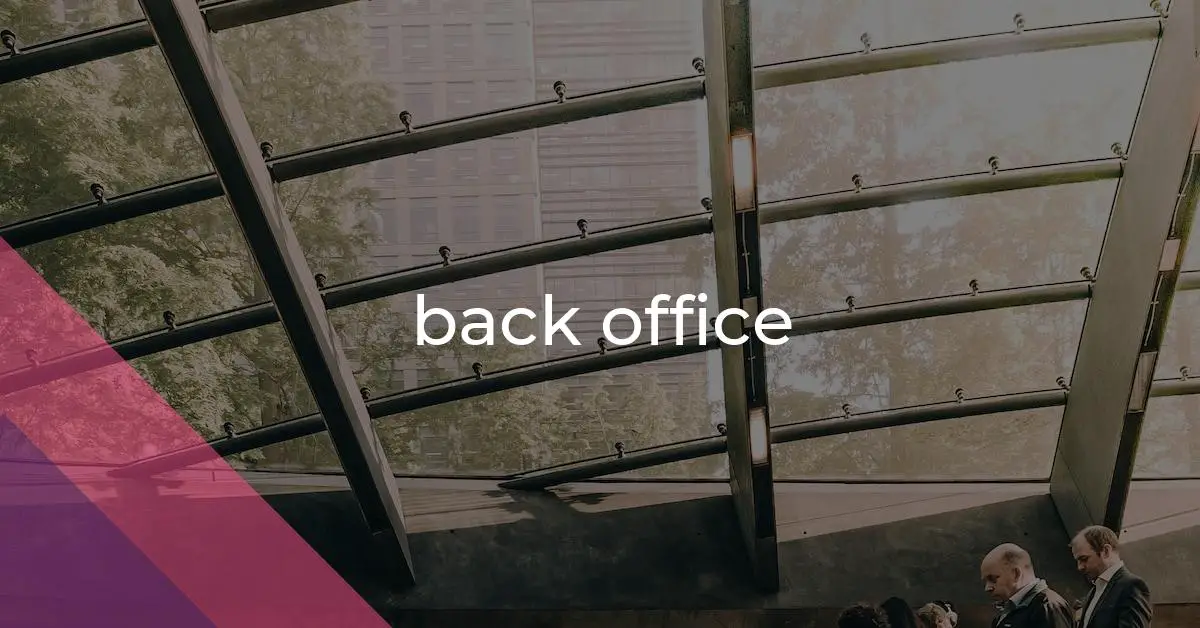back office: Idiom Meaning and Origin
What does ‘back office’ mean?
The idiom "back office" refers to the administrative and support functions of a business that are not directly involved in the production of goods or services. It typically includes tasks related to accounting, human resources, and technology.

Idiom Explorer
The idiom "in the business of" means actively engaged or involved in a particular activity or profession.
The idiom "ins and outs" refers to the intricate details or complexities of a particular situation or activity.
The idiom "in business" means actively engaged in commercial or professional activities, usually referring to someone who is running a company or involved in a trade or profession.
The idiom "I just work here" is used to express a lack of responsibility or control over a situation, often suggesting that the person speaking is merely an employee and shouldn't be held accountable for any problems or decisions.
The idiom "hand off" means to pass or transfer the responsibility or control of something to someone else.
The idiom "farm out" means to assign or subcontract a task or work to someone else, usually outside of one's organization. It implies delegating the responsibility and often suggests outsourcing to reduce costs or increase efficiency.
A "faceless bureaucrat" refers to an anonymous, low-level government official who lacks individuality and is seen as unimportant or lacking accountability. The term highlights the impersonal nature of bureaucracy.
The idiom "engine room" refers to the place where the machinery or engines of a ship or other vehicle are located. In a metaphorical sense, it can mean the central or most important part of a system or organization.
A "desk jockey" refers to someone who works primarily or exclusively at a desk, often in an office setting. It implies that the person is not directly involved in physical or active work and may have a job that is considered mundane or unexciting.
The idiom "busy work" refers to tasks or activities that appear to be important or productive, but in reality, they are trivial and do not contribute to any meaningful or significant outcome.
The Enigmatic World
Back office refers to the administrative and support functions of an organization that are essential for its day-to-day operations, but are not directly involved in generating revenue.
One possible interpretation of the idiom comes from the layout of traditional office spaces, where the front office is accessible to clients or customers, while the back office is located behind the scenes. In this sense, the back office represents the behind-the-scenes operations and support functions that are vital for the smooth functioning of a business.
The term "back office" gained popularity in the financial industry, particularly in the early 20th century, to describe the administrative and support departments that handle tasks such as accounting, human resources, IT, and compliance. These functions are crucial for the efficient operation of financial institutions, but they are not customer-facing. The idiom has since expanded beyond the financial sector and is now widely used in a variety of industries.
While the idiom itself does not have a specific etymology, its usage is closely tied to the growth and development of modern business practices. As companies expanded, specialized roles and departments emerged to handle the various administrative tasks necessary for business operations. The need to differentiate between customer-facing and support functions led to the distinction between front office and back office.
Today, the term "back office" is used in a broader sense to encompass a range of operational and support functions. It can refer to any department or team that provides administrative, technical, or logistical support to the main activities of an organization. This includes areas such as procurement, supply chain management, data management, and quality assurance. The back office ensures that the necessary infrastructure and resources are in place for the front office to carry out their duties effectively.
Despite its widespread usage, the idiom "back office" still retains a certain level of ambiguity and can vary in meaning depending on the context. Its precise definition may vary from one organization to another, as businesses have different structures and operational requirements. However, the common thread across all interpretations is the idea that the back office plays a crucial role in supporting and enabling the overall functioning of a business.
The idioms "behind the scenes" and "behind the counter" are related to the idiom back office. They all convey the notion of operations and functions that are not visible or apparent to the general public. "Behind the scenes" refers to the hidden or unseen aspects of a production or event, such as the backstage area of a theater or the behind-the-scenes work that goes into making a movie. "Behind the counter" is used in retail or service industries to describe the areas of a business that are accessible only to employees, where the actual work and operations take place. These idioms share the common idea that there is a distinction between what is visible or accessible to the public and what happens behind closed doors.
The idiom "back up" also has a connection to the idiom back office. "Back up" refers to the act of providing support or assistance, particularly in times of difficulty or when there is a need for additional resources. In the context of the back office, "back up" can be seen as the support and assistance provided by the administrative and support functions to the main activities of an organization. The back office "backs up" the front office by ensuring that the necessary resources, systems, and processes are in place to support the organization's operations.
The idiom "back office" is a widely used term in the business world to refer to the administrative and support functions of an organization. While its exact origins are unclear, it has become deeply embedded in business vocabulary and is used to describe the behind-the-scenes operations that are essential for the smooth running of a company. The idiom's usage has evolved over time, expanding beyond the financial industry to encompass a range of operational and support functions in various sectors. Despite its prevalence, the idiom retains some ambiguity and can have different interpretations depending on the context. Overall, the idiom reflects the importance of the back office in supporting the front office and enabling the overall success of a business.
Example usage
Examples: 1. The back office handles all the administrative tasks for the company, such as payroll and human resources. 2. The back office plays a crucial role in managing customer data and processing orders smoothly. 3. As a retail store manager, I spend most of my time in the back office, dealing with inventory and paperwork. Analysis:
The idiom "back office" is commonly used to refer to the administrative and support functions of an organization that are not directly involved in the production or delivery of goods or services. It typically includes tasks such as paperwork, data management, accounting, and other back-end operations. In example 1, the phrase is used to describe the department within a company that handles administrative tasks like payroll and human resources. Example 2 demonstrates the importance of the back office in managing customer data and ensuring the smooth processing of orders. The phrase is also used to describe a physical space, as shown in example 3, where someone, like a store manager, spends their time managing inventory and handling paperwork.
More "Business" idioms



